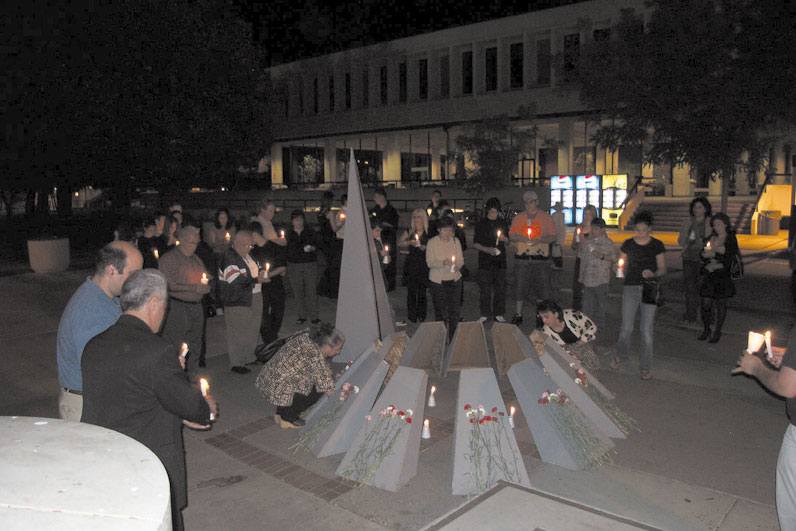Jack Arikian
Special to Hye Sharzhoom
As an Armenian born and raised in the United States, I have heard hundreds of stories about the difficulties and challenges our people have endured throughout history. In fact, almost every Armenian has heard the stories concerning the battles of our bravest warriors, King Drtad and Vartan Mamigonian, or of Armenia being the first nation to declare Christianity as a state religion in 301 AD; the most painful is the Armenian Genocide of 1915.

We have been told these stories to help us appreciate how far our people have come and the struggles we have overcome, but more importantly, to preserve the culture. These historic events created who we are today and help define the pride and strength of the Armenian people. It is important that we tell these stories to strengthen our knowledge for future generations, so that centuries from now, future generations will understand what it means to be an Armenian and will be proud to say that they are Armenian.
On Friday evening, April 23, the Armenian Students Organization and the Armenian Studies Program gave the Armenian community an opportunity to hear more accounts and remember those killed during the genocide.
Two films were screened, “Hidden Holocaust” and “Armenia: The Betrayed,” followed by a candlelight march and vigil. The vigil was held in front of the model of Dzidzernagapert (the Armenian Martyr’s Monument in Yerevan, Armenia), in the Free Speech area. Rev. Ara Guekguezian, pastor of Pilgrim Armenian Congregational Church, gave a special prayer on this occasion, while those in attendance remembered the victims of the Armenian Genocide.
Barlow Der Mugrdechian of the Armenian Studies Program introduced each film and also answered questions after the screening. Both films presented eyewitness accounts and stories of the Armenian atrocities inflicted by the Young Turks of the Ottoman Empire. Both films shared the same focus, though presenting them from a different perspective.
The first film, “Hidden Holocaust,” which aired on the A & E cable network in 1992, presented the cold, hard facts of the events of 1915. It delivered an accurate historical portrayal of the murder, rape, and abuse perpetrated on the Armenians. “Hidden Holocaust” gave me the opportunity to learn more about my people and helped me to not forget my ancestors’ relentless pursuit to overcome any setback.
I remember one eye-witness account from the movie in particular, that of Mariam Davis, who, at the innocent age of two saw her entire family die during the attacks. The only reason she survived was because she hid among a group of dead people. Hearing these chilling accounts brought tears to my eyes; what did Mariam Davis do to deserve such a life? What did the Armenians do to deserve the Young Turks’ plan to obliterate their people? Davis, as many other Armenians, missed out on a tremendous part of life. Stories like this should be told and repeated to keep the memories alive.
While the first film was difficult to watch because of its graphic nature, the second one, “Armenia: The Betrayed,” produced by James Miller of the BBC, was even harder to watch. It presented Turkey’s position on the Genocide, or rather its denial of the events. I found the second movie to be especially disturbing since not only the Turkish government, but also the most of the people, deny the facts.
Overall, this film illustrated that the people of Turkey are completely unaware of the facts; actually, they believe millions of people, both Turkish and Armenian, died during World War I. More specifically, the government goes as far as to say they were defending themselves against the Armenians. Having extensively studied this period in Armenian history by taking Armenian Studies classes, I found these statements to be far from the truth. In my opinion, these statements pour salt in the wound and this attitude by the Turkish government should fuel the fire of the Armenians to tell our story.
Though I did not live during this period, I share the pain of my ancestors, because this era of Armenian history changed the complexion of all our lives. I need not share the stories of my grandparents because every Armenian has stories close to their hearts. What happened to the Armenians touches all of us in different ways, yet the facts do not change. This is why I commend the Armenian Students Organization and Armenian Studies Program for planning such a meaningful event and for giving us the opportunity to gather. We should not forget and should continue to share stories and educate the world on what happened to our people.
The candlelight vigil gave our community the opportunity to gather and reflect on the past and to remember what our ancestors endured to give us what we have today.
 Hye Sharzhoom Armenian Action
Hye Sharzhoom Armenian Action